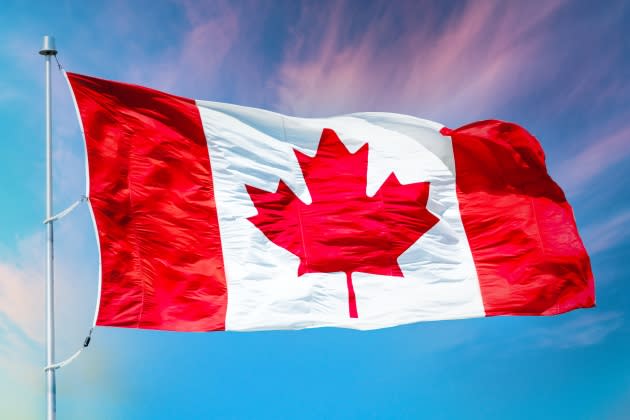Streaming Bill Regulating Netflix, Amazon And Co In Canada Becomes Law

Canada has brought its Online Streaming Act into law after years of heated debate.
The key impact of Bill C-11 is that streamers such as Netflix, Prime Video and Disney+ will now be regulated by similar laws to those overseeing the country’s networks.
More from Deadline
WGA Reviews & Counters Latest AMPTP Offer As Potential Strike Deadline Moves Closer - Update
Adam Brody Joins Kristen Bell In Erin Foster's Netflix Comedy Series
In practice, the streaming services are now required to “contribute to the creation and availability of Canadian stories and music” and “pay their fair share in supporting Canadian artists, just like traditional broadcasters,” as per government bill guidelines issued last year. Canadian networks are compelled to hit certain quotas to fulfil terms of their licenses.
Should streamers fail to comply, local regulator the Canadian Radio-television and Telecommunications Commission (CRTC) can impose fines and other penalties.
The bill passed a final hurdle in the Senate yesterday and received royal assent, meaning it is now Canadian law.
The new law has created passionate supporters and detractors since Justin Trudeau’s government first introduced the plan, with YouTube among the organizations to voice disapproval from a business perspective. Some Canadians claim it represents censorship but the government says the key elements are targeted at commercial companies and do not apply to individuals creating content online.
The government says the bill will “create more opportunities for Canadian producers, directors, writers, actors, and musicians to create high quality audio and audiovisual content,” give audiences easier access to Canadian and Indigenous stories, and creates “one fair set of rules for all comparable broadcasters — online or on traditional media.”
Canada’s broadcasting infrastructure has broadly been designed to protect Canadian English- and French-language heritage and to build an ecosystem of tightly regulated commercial, public and specialty networks. However, the last changes to the Broadcasting Act before this week were in 1991, well before streaming services had risen.
International streamers to this point have, to an extent, operated outside the existing system. Netflix, for example, has chosen to invest huge amounts in local production as a way of paying its way, but is broadly against regulation and quotas in the local territories where it operates.
Streamers are also facing similar regulation in Australia, where the government is planning to introduce content quotas as part of its five-year ‘Revive’ National Cultural Policy. The EU already imposes 30% local content quotas on streamers — most reach or exceed that target.
The UK has also been tightening rules on SVoDs, and can now fine them if their content violates fairness, accuracy or privacy principles. Yesterday, Netflix’s UK Head of Policy Benjamin King said the plans could “prove unworkable or risk a chilling effect” on the streamer’s appetite for making docs in the country.
Netflix’s biggest Canadian originals include Anne with an E, which was co-produced with CBC. The streamer was hailed with the global success of CBC Comedy series Schitt’s Creek, whose popularity exploded after it was added to service internationally.
Producers back bill
Cananda’s production community has responded by backing the bill, noting that concerns over C-11 remain the need to reform Canada’s Broadcasting Act was essential.
The Canadian Media Producers Association released a statement commending the government and Heritage Minister Pablo Rodriguez “for his heroic efforts in securing the passage of Bill C-11.”
“The modernization of Canada’s Broadcasting Act has been years in the making, and while the government’s stated goal of levelling the playing field has not yet been achieved, the bill contains many other positive elements that we applaud,” said Reynolds Mastin, the CMPA’s President and CEO.
The CMPA said the bill recognized “the vital role independent producers play in Canada’s broadcasting system. The bill enshrines critical provisions that ensure that producers can significantly and equitably benefit from their own stories. This will support the growth of more Canadian companies and contribute to a vibrant future for the country’s media production industry.”
The CMPA added provisions in the law would “advance representation and participation from Indigenous, Black and other racialized creators,” adding: “This will foster a more inclusive broadcasting system that better reflects the needs and interests of all Canadians.”
However, the CMPA warned the bill “contains a provision that risks creating a two-tier system where foreign streamers are held to a lower standard than Canadian broadcasters,” without pointing specifically to the clause.
“The unintended result could be foreign streamers being allowed to use fewer Canadian creators in the production of Canadian programming,” claimed the CMPA. “This flaw must be addressed in the pending policy direction to the CRTC, or Bill C-11 risks reinforcing, rather than reducing, the ongoing pressures faced by the domestic production sector.”
“We are on the precipice of a pivotal moment in Canadian broadcasting history. It took 30 years before the Broadcasting Act was updated,” added Mastin. “Since we don’t know when this opportunity will present itself again, it’s important that we get it right. We’re encouraged by the passage of Bill C-11, and are optimistic that the Minister’s policy direction to the CRTC will go further in helping the bill to achieve its fundamental objective of levelling the playing field.”
Best of Deadline
2023-24 Awards Season Calendar - Dates For Oscars, Emmys, Major Film Festivals & More
Hollywood & Media Deaths In 2023: Photo Gallery & Obituaries
2023 Premiere Dates For New & Returning Series On Broadcast, Cable & Streaming
Sign up for Deadline's Newsletter. For the latest news, follow us on Facebook, Twitter, and Instagram.

